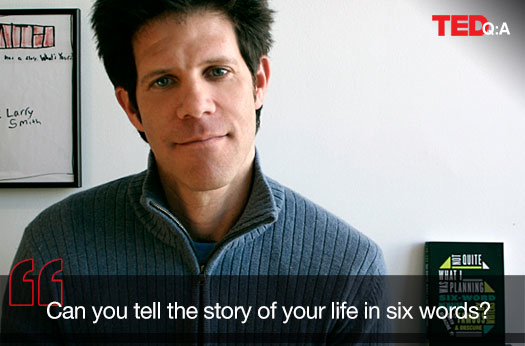
In 2006, Larry Smith issued a challenge to his online community: encapsulate your life in a six-word memoir. It quickly became a phenomenon, with people all around the world chiming in. Smith is still fascinated by the short tales people tell about themselves — especially those told by kids. And so he conceptualized the TED Book Things Don’t Have to Be Complicated: Illustrated Six-Word Memoirs by Students Making Sense of the World. The twist? Students would draw as well as write their six-word manifestos.
Smith sat down yesterday for a live chat on TED conversations. Read the full conversation or check out highlights below.
First off, Larry Smith asked: Can you define your life in 6 words?
“So far, so good. What’s next?” —Alan Russell
“In the womb of Knowledge, Reborn.” — Paul Kirhagis
“Making the most of every opportunity.” — Elizabeth Gu
“Born and dreaming myself awake since.” — Natasha Nikulina
“Grateful cancer survivor, entrepreneur and mom.” —Gina Danford
“Head in stars, feet on Earth.” — Lena Gorska
“Too tough to analyze, simply living!” — Yash Jain
“Don’t panic, persevere and play guitar.” —Aldous Blair
“Creator of images, sees miracles daily.” —Richard Efthim
“Opening windows by slamming the doors.” —Katie Turnbow
“Retired; looking for my next purpose.” —P.R. Dannar
“Swimming upstream and leaving a trail.” —Aleksandra Radmanovic
Holly Hargrove wrote:
“I share this book with my students each year (6th grade gifted students) and have them do this for characters in the novels we read. Such a great creative exercise!”
To which Larry Smith answered:
“Thanks, Holly. Six Words are really popular in classrooms, and having your students do six-word memoirs for characters is really interesting. Would you share a few?”
Holly replied:
“Sure thing! Here’s one a student wrote about Hamlet: ‘King’s ghost: first domino to fall.’
Here’s one about Polonius: ‘I have too much to say to…’ (The joke was that Polonius, being such a talker, couldn’t contain himself to 6 words.)
I find this to be incredibly fun while it also challenges the students to distill their knowledge about a topic or character down to its most basic parts. They LOVE this assignment. And I love your book!”
Rachel Lehmann-Haupt wrote:
“The thing that has really struck me about this book is that it kinda makes you see that age doesn’t matter. A 7-year-old can be very wise and, in a way, seem wiser than some adults!
I’m also curious: what are some of the reactions you’ve been getting to illustrated six-word memoirs?”
To which Larry Smith responded:
“The reaction has been great. People are blown away by how these students — most between the ages of 7 and 21 — are so deep, smart, funny. And I think having visuals often enhances, yes, but more than that it really re-imagines the form. We’re still talking about a short, meaningful piece of self-expression but now there’s another way to do it (while still keeping it to six words).
You really see how “the wisdom of babes” can be true. At my first ‘talk’ I was at my nephew’s third-grade classroom and heard six-word brilliance such as:
‘Tried surfing on a calm day.’
‘Life is better in soft pajamas.’
‘Nine years stacked within my soul.’
This kids are eight and nine — amazing, right?”
To which Zahra Sabir said:
“Those are amazing sentences. Open for interpretation. It shows how simple and yet how complex our existence and decisions in life are! Great project, Larry!”
Kathleen Silloway wrote:
“I was struck by how so many of the older students focused their tales on dreams and breaking free of rules and boundaries — pushing for themselves to be accepted for who they are — whereas the younger ones are very straightforward, dealing with life (afraid of bears, wanting to go to college). Is this typical?”
Larry responded:
“That’s a great observation. I think the younger kids, especially ones who haven’t hit puberty, are in their own way more rational. That’s not exactly the right word. But they’re very much in the moment. Broadly speaking, older kids have more angst but also more dreams. This is not only typical of this book but very consistent with what we see on SMITHmag and SMITHTeens, and what I hear when I do workshops or go into classrooms.
And I did a project with AARP Magazine a few years ago and the memoirs from older folks tended to be really positive (‘Sixty. Single. Rich. Call me collect’) and full of life lessons (‘When cookies are passed, take one’ and ‘Sign the card, eat the cake’).”
.
Things Don’t Have To Be Complicated is part of the TED Books series. It available for the Kindle and through the iBookstore. Or download the TED Books app for your iPad or iPhone. A subscription costs $4.99 a month, and is an all-you-can-read buffet.
Comments (8)
Pingback: TED Blog – IPCareerAdvising
Pingback: Ideas Fair | Dialogue Partners
Pingback: Welcome | Remembered Stories
Pingback: 6 Word Memoir | Memoir of Transcendence
Pingback: Wizmo Blog » Blog Archive » Life, in six words: Highlights from our chat with Larry Smith